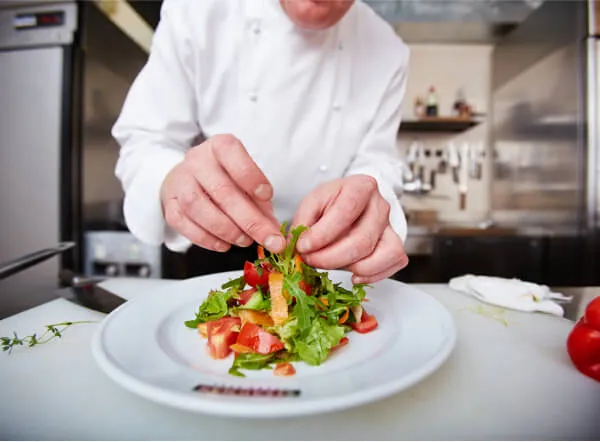Institutional Meal Worker

Institutional meal preparation is a growing field that involves creating large quantities of a limited number of menu items for hospitals, schools and other large settings. The following resources could help you determine whether becoming an institutional meal worker is a good choice for you.
<h2 id="section---IsInstitutionalCookingOrFoodPreparationForMe">Is Institutional Cooking or Food Preparation for Me?</h2>
<h3 id="section---CareerDescription">Career Description</h3>
<p>Institutional meal workers include <a href="https://learn.org/articles/How_Can_I_Work_in_Food_Preparation.html">food preparation workers</a> and <a href="https://learn.org/articles/Professional_Cook_Career_Profile_Employment_Outlook_and_Educational_Requirements.html">cooks</a> employed in schools, hospitals and other institutions. This involves working from preset menus to prepare meals for large groups of people. Each meal generally includes a small number of entrees, side dishes and desserts prepared in large quantities.
</p>
<h3 id="section---JobResponsibilities">Job Responsibilities</h3>
<p>As an <a href="https://learn.org/articles/Cafeteria_Cook_Jobs_Frequently_Asked_Salary_and_Career_Questions.html">institutional meal worker</a>, you might have cooking duties or perform food preparation. Cooks measure, combine and cook ingredients to prepare meals, whereas food preparation workers assist cooks by performing a variety of tasks. These tasks can include peeling and cutting vegetables, monitoring oven or stovetop temperatures, measuring ingredients and trimming meat. You might also be responsible for keeping the kitchen clean and organized, <a href="https://learn.org/articles/Whats_it_Like_to_Work_on_a_Food_Service_Crew.html">serving food</a> or washing dishes.
</p>
<p>The quality and comfort of institutional kitchens vary, but you can expect to work in close quarters near hot ovens and stoves. Although institutional meals are generally prepared in advance, you may still be under some pressure to prepare meals quickly. Also, you must be able to communicate with other kitchen workers and adhere to sanitation and safety guidelines. Personal cleanliness and keen senses are also important if you want to work in this field.
</p>
<h3 id="section---EmploymentInformation">Employment Information</h3>
<p>According to the U.S. Bureau of Labor Statistics (BLS), employment of institutional cooks is expected to increase by 13% between 2012 and 2022, which is about average for all occupations. Jobs for food preparation workers were projected to grow more slowly than the average, at 4%, during the same time period. As of May 2013, the BLS-reported median hourly salary for institutional cooks was $11.14 and $9.35 for food preparation workers.
</p>
<h2 id="section---HowCanIBecomeAnInstitutionalMealWorker">How Can I Become an Institutional Meal Worker?</h2>
<h3 id="section---TrainingOptions">Training Options</h3>
<p>Most food preparation workers and cooks learn their trade on the job and advance with experience. Some beginning jobs don't even require a <a href="https://learn.org/articles/How_Do_I_Earn_a_High_School_Diploma.html">high school diploma</a>. On-the-job training programs often begin with basic safety and sanitation regulations and go on to cover cooking procedures, including <a href="https://learn.org/articles/What_Subjects_are_Taught_in_a_Typical_Food_Handler_Course.html">food handling</a> and preparation.
</p>
<h3 id="section---FormalTraining">Formal Training</h3>
<p>From high school to vocational school and community college, many courses and training programs are available that teach <a href="https://learn.org/articles/Food_Preparation_Certification_Options_Your_Questions_Answered.html">food preparation</a> and culinary skills. Some employers may prefer if you have some form of formal training, especially if you're applying for a position as a cook or other advanced position. A formal training program can take anywhere from a few months to more than two years and may lead to a certificate, diploma or associate degree. Some <a href="https://learn.org/articles/Culinary_Arts_Restaurant_Management_Associates_Degree.html">restaurant management programs</a> offer courses in the related area of institutional dining services.
</p>
<p>Formal training programs cover many of the same topics as an on-the-job training program, including sanitation and food handling procedures and basic cooking techniques like grilling, baking and broiling. You might also learn about <a href="https://learn.org/articles/Culinary_History_Degree_Programs_Your_Questions_Answered.html">culinary history</a>, <a href="https://learn.org/articles/Nutrition_How_to_Become_a_Nutritionist_in_5_Steps.html">nutrition</a>, menu planning, recipe creation and preparing meals according to a budget. Culinary training may also include instruction in basic management skills and <a href="https://learn.org/articles/Line_Cook_Jobs_Frequently_Asked_Salary_and_Career_Questions.html">line cooking</a>, which are skills that can be particularly relevant to institutional settings.</p>



.svg)